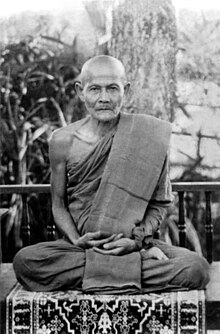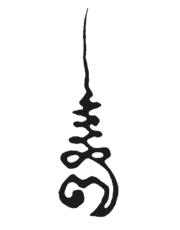Ajahn Mun
This article includes a list of references, related reading, or external links, but its sources remain unclear because it lacks inline citations. (May 2024) |
Ajahn Mun | |
|---|---|
 | |
| Personal life | |
| Born | Mun Kaenkaew January 20, 1870 |
| Died | November 11, 1949 (aged 79) Wat Pa Sutthawat, Mueang Sakon Nakhon, Sakon Nakhon, Thailand |
| Nationality | Thai |
| Other names | Thai: Luang Pu Mun (หลวงปู่มั่น) Ajahn Mun (Thai: อาจารย์มั่น) |
| Occupation | Meditation master |
| Religious life | |
| Religion | Buddhism |
| School | Theravada, Dhammayuttika Nikaya |
| Lineage | Thai Forest Tradition |
| Dharma names | Bhuridatto |
| Senior posting | |
| Teacher | Ajahn Sao Kantasīlo |
| Predecessor | Ajahn Sao Kantasīlo |
| Website | Full Bio |

| Thai Forest Tradition | ||||||||||||||||||||||||||||||||||||||||
|---|---|---|---|---|---|---|---|---|---|---|---|---|---|---|---|---|---|---|---|---|---|---|---|---|---|---|---|---|---|---|---|---|---|---|---|---|---|---|---|---|
 | ||||||||||||||||||||||||||||||||||||||||
| Bhikkhus | ||||||||||||||||||||||||||||||||||||||||
|
||||||||||||||||||||||||||||||||||||||||
| Sīladharās | ||||||||||||||||||||||||||||||||||||||||
|
||||||||||||||||||||||||||||||||||||||||
| Related Articles | ||||||||||||||||||||||||||||||||||||||||
Mun Bhuridatta (Thai: มั่น ภูริทตฺโต, RTGS: Man Phurithatto; Lao: ຫຼວງປູ່ມັ່ນ ພູຣິທັຕໂຕ; 1870–1949) was a Thai bhikkhu from Isan region who is credited, along with his mentor, Ajahn Sao Kantasīlo, with establishing the Thai Forest Tradition or "Kammaṭṭhāna tradition" that subsequently spread throughout Thailand and to several countries abroad.
Biography
[edit]Ajaan Mun was born in Baan Kham Bong, a farming village in Ubon Ratchathani Province, Isan.
Ordained as a monk in 1893, he spent the remainder of his life wandering through Thailand, Burma, and Laos, dwelling for the most part in the forest, engaged in the practice of meditation. He attracted an enormous following of students and, together with his teacher, Sao Kantasīlo (1861–1941) established the Thai Forest Tradition (the kammaṭṭhāna tradition) that subsequently spread throughout Thailand and to several countries abroad. He died at Wat Suddhavasa, Sakon Nakhon Province.
Forest meditation
[edit]Ajaan Mun's mode of practice was solitary and strict. He followed the vinaya (monastic discipline) faithfully, and also observed many of what are known as the 13 classic dhutanga (ascetic) practices, such as living off alms food, wearing robes made of cast-off rags, dwelling in the forest and eating only one meal a day. Monks following this tradition are known as thudong, the Thai pronunciation of this Pali word.
Searching out secluded places in the wilds of Thailand and Laos, he avoided the responsibilities of settled monastic life and spent long hours of the day and night in meditation. In spite of his reclusive nature, he attracted a large following of students willing to put up with the hardships of forest life in order to study with him.
Further reading
[edit]- The Customs of the Noble Ones, by Thanissaro Bhikkhu describes the Thai forest tradition started by Ajaan Mun.
- A Heart Released - The Teachings of Phra Ajaan Mun Bhūridatta Thera, is a record of passages from Ajaan Mun sermons, made during the years 1944-45 by two monks who were staying under his guidance. (Translated from the Thai by Ṭhānissaro Bhikkhu)
- Buswell, Robert Jr; Lopez, Donald S. Jr., eds. (2013). Princeton Dictionary of Buddhism (Ajahn Mun Bhūridatta). Princeton, NJ: Princeton University Press. p. 22. ISBN 9780691157863.
- Venerable Ācariya Mun Bhuridatta Thera: A Spiritual Biography, (online as html) "The biography of Ven. Ācariya Mun Bhuridatta composed by his disciple and fellow Ven. Ācariya Maha Boowa Ñānasampanno. Next to countless anecdotes one may find a great reflection of a live of a true Buddhist forest monk."
- Patipada – Venerable Ācariya Mun's Path of Practice, "A translation of the Dhutanga Kammaṭṭhāna practices of Venerable Ajaan Mun Bhūridatta Thera, also written by Ven. Ācariya Mahā Boowa Ñāṇasampanno."
External links
[edit] Media related to Mun Bhuridatto at Wikimedia Commons
Media related to Mun Bhuridatto at Wikimedia Commons
